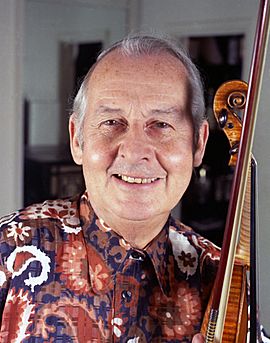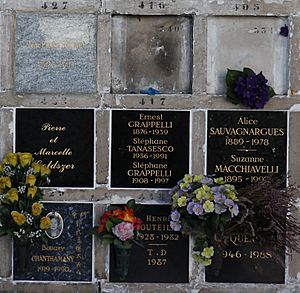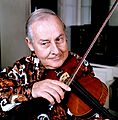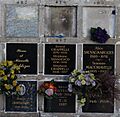Stéphane Grappelli facts for kids
Quick facts for kids
Stéphane Grappelli
|
|
|---|---|
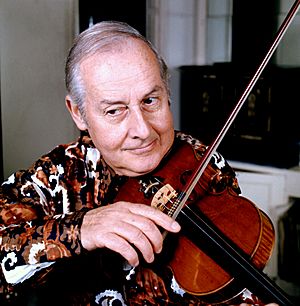
Grappelli in 1976, by Allan Warren
|
|
| Background information | |
| Birth name | Stefano Grappelli |
| Born | 26 January 1908 Paris, France |
| Died | 1 December 1997 (aged 89) Paris, France |
| Genres | Swing, continental jazz, gypsy jazz |
| Occupation(s) | Musician |
| Instruments | Violin, piano, saxophone, accordion |
| Associated acts | Django Reinhardt, Quintette du Hot Club de France, Yehudi Menuhin, Oscar Peterson, David Grisman |
Stéphane Grappelli (born Stefano Grappelli) was a famous French jazz violinist. He was born on January 26, 1908, and passed away on December 1, 1997. He is best known for starting the Quintette du Hot Club de France in 1934 with guitarist Django Reinhardt. This group was one of the first jazz bands to use only string instruments. People often called him "the grandfather of jazz violinists" because he kept playing concerts all over the world even when he was in his eighties.
For the first 30 years of his career, his last name was spelled Grappelly. In 1969, he went back to the original Italian spelling, Grappelli. Today, almost everyone uses the Grappelli spelling, even for his older recordings.
Contents
About Stéphane Grappelli
His Early Life
Stéphane Grappelli was born in Paris, France. His father, Ernesto Grappelli, was Italian, and his mother, Anna Emilie Hanoque, was French. Ernesto was a scholar who taught Italian and wrote articles. Stéphane's mother died when he was five years old, leaving his father to take care of him.
When World War I started in 1914, Ernesto was still an Italian citizen. He had to join the Italian Army. Ernesto asked American dancer Isadora Duncan, who lived in Paris, to look after his son. Stéphane went to Duncan's dance school at age six and learned to love French Impressionist music. When the war got closer, Duncan left the country. Ernesto then placed Stéphane in a Catholic orphanage.
Grappelli later said his early life was like a story from a Charles Dickens novel. He even mentioned trying to eat flies because he was so hungry. He stayed at the orphanage until his father returned from the war in 1918. They settled in an apartment in Barbès, Paris. On July 28, 1919, his father made Stéphane a French citizen, and his first name, "Stefano," became "Stéphane." Grappelli started playing the violin at age 12. His father bought him a small violin by pawning a suit.
After learning on his own for a short time, Grappelli joined the Conservatoire de Paris on December 31, 1920. His father hoped he would learn music theory and ear training there. In 1923, Grappelli graduated with a good medal. Around this time, his father remarried and moved away, but Grappelli stayed in Paris.
Starting His Music Career
At 15, Grappelli began playing music on the streets to support himself. An older violinist noticed his playing and invited him to play in the orchestra pit at the Théâtre Gaumont. He played there for six hours every day for two years, providing music for silent films. During breaks, he would visit a cafe called Le Boudon and listen to jazz music from an American "proto-jukebox." This is where he first discovered jazz.
In 1928, Grappelli was part of the orchestra at the Ambassador Hotel. Famous bandleader Paul Whiteman and jazz violinist Joe Venuti were performing there. Jazz violinists were rare back then. Grappelli was impressed by Venuti's violin playing, especially when he played the song "Dinah." This inspired Grappelli to start developing his own jazz-influenced violin style.
For a while, Grappelli stopped playing the violin and tried playing the piano in a big band led by a musician named Grégor. One night, Grégor found out Grappelli used to play the violin. Grégor borrowed a violin and asked Grappelli to play "Dinah." Grégor loved what he heard and encouraged Grappelli to go back to playing the violin.
Meeting Django Reinhardt
In 1931, while playing with a jazz band, Grappelli met gypsy jazz guitarist Django Reinhardt. Django was looking for a violinist who liked jazz. He invited Grappelli to play with him in his caravan. They played together for hours that afternoon. However, their commitments to their own bands kept them from working together full-time.
They met again in 1934 in London, England, and decided to form a musical partnership. Pierre Nourry, from the Hot Club de France, invited Reinhardt and Grappelli to create the Quintette du Hot Club de France. They were joined by Louis Vola on bass and Joseph Reinhardt (Django's brother) and Roger Chaput on guitar. This group became very famous.
The Quintette du Hot Club de France broke up in 1939 when World War II began. Grappelli was in London at the time and stayed there during the war. In 1940, jazz pianist George Shearing started his career playing in Grappelli's band.
After the War
After the war, Django Reinhardt came to England to reunite with Grappelli. They recorded some songs together in 1946. Grappelli decided to stay in England, while Reinhardt returned to Paris. They would meet up occasionally for concerts when Grappelli visited Paris, but the original Quintette never fully reformed. They also toured Italy briefly, and some of those recordings can be heard on the album Djangology. These were their last recordings together, as Reinhardt moved into a more modern jazz style before his early death in 1953.
During the 1950s, Grappelli made some recordings, but it was harder for a swing violinist like him to find opportunities. He wasn't very interested in the new bebop jazz style that was popular then. In the 1960s, Grappelli often appeared on radio shows. In 1967, he returned to Paris to play regularly at a restaurant in the Paris Hilton Hotel. He played "lounge jazz" with a pianist and drummer, which gave him steady work.
Later Career and Collaborations
In 1971, British TV host Michael Parkinson invited Grappelli to his show. He also invited classical violinist Yehudi Menuhin to perform a duet with Grappelli. Menuhin was a classical musician and didn't have jazz training, but their performance was very popular. They went on to record three albums together between 1972 and 1976. Menuhin played parts that Grappelli wrote, while Grappelli improvised in his jazz style.
In 1973, British guitarist Diz Disley suggested Grappelli go back to playing with acoustic guitars and a double bass, like the "Hot Club" sound. Grappelli was unsure at first, but after a great reception at the Cambridge Folk Festival, he loved the idea. He then toured the world with a guitar-based trio for the rest of his life.
Grappelli played on hundreds of recordings with many famous musicians. These included Duke Ellington, pianists Oscar Peterson and Michel Petrucciani, violinists Svend Asmussen and Jean-Luc Ponty, and even pop singer Paul Simon. He also recorded a violin solo for the title track of Pink Floyd's 1975 album Wish You Were Here. It was almost inaudible in the original mix, but a remastered version in 2011 made it easier to hear.
Grappelli appeared in the 1978 film King of the Gypsies and in an episode of "Little House on the Prairie" in 1975. In the 1980s, he performed several concerts with British cellist Julian Lloyd Webber. In 1997, Grappelli received the Grammy Lifetime Achievement Award for his amazing career. He is also in the Down Beat Jazz Hall of Fame.
Grappelli continued to tour successfully until the last year of his life. In 1997, even though his health was not good, he toured the United Kingdom, Australia, and New Zealand. He gave his last public performance in Christchurch, New Zealand. He made his final recording in August 1996, with classical violinist Iwao Furusawa.
His Personal Life
Stéphane Grappelli had a daughter named Evelyne in 1935. She lived in Paris during World War II and reunited with her father in London in 1946. Grappelli never married. From 1981 until his death, his companion was Joseph Oldenhove.
Stéphane Grappelli passed away in Paris on December 1, 1997, from heart failure after some minor brain issues. His funeral was held on December 5, near the hospital where he was born 89 years earlier. His body was cremated, and his ashes were placed in the Père Lachaise Cemetery in Paris.
A documentary called Stéphane Grappelli – A Life in the Jazz Century tells his life story.
Discography
Albums
- Djangology: Django Reinhardt, the Gypsy Genius (1936 to 1940, released in 2005, Bluebird)
- Stéphane Grappelli and Django Reinhardt the Gold Edition (1934 to 1937, copyright 1998)
- Unique Piano Session Paris 1955 (1955, Jazz Anthology)
- Improvisations (Paris, 1956)
- Feeling + Finesse = Jazz (1962, Atlantic)
- Afternoon in Paris (1971, MPS)
- Manoir de Mes Reves (1972, Musidisc)
- Homage to Django (1972, released 1976, Classic Jazz)
- Stéphane Grappelli (1973, Pye)
- Black Lion at Montreux with the Black Lion All-stars (Black Lion), recorded 4 July 1973
- Just One of Those Things! (1973, Black Lion) Recorded at the 1973 Montreux Jazz Festival
- I Got Rhythm! (1974, Black Lion) with The Hot Club of London (Diz Disley/Denny Wright/Len Skeat), recorded at the Queen Elizabeth Hall, London, 5 November 1973
- The Talk of the Town (1975, Black Lion) with Alan Clare
- Satin Doll (1975, Vanguard)
- Parisian Thoroughfare with Roland Hanna/Mel Lewis/George Mraz (1975, Arista/Freedom)
- The Rock Peter and the Wolf (1976, RSO)
- +Cordes (1977, Musidisc)
- Steph 'n' Us (1977, Cherry Pie) with Don Burrows & George Golla – AUS #38
- Live at Carnegie Hall (1978, Signature)
- Uptown Dance (1978, Columbia)
- Young Django (1979, MPS) with Philip Catherine/Larry Coryell/Niels-Henning Ørsted Pedersen
- Stéphane Grappelli '80 (1980, Happy Bird)
- Tivoli Gardens, Copenhagen, Denmark (Pablo Live, 1980)
- Live at Carnegie Hall (1983, Dr Jazz) with Diz Disley/John Etheridge/Brian Torff
- Vintage 1981 (1981, Concord)
- Just One of Those Things (1984, EMI)
- Grappelli Plays George Gershwin (1984, Musidisc)
- Fascinating Rhythm (1986, Jazz Life)
- Live in San Francisco (1986, Blackhawk)
- Classic Sessions: Stéphane Grappelli with Phil Woods and Louie Bellson (1987, RTV)
- Stéphane Grappelli Plays Jerome Kern (1987, GRP)
- The Intimate Grappelli (1988, Jazz Life)
- How Can You Miss with Louie Bellson and Phil Woods (1989, Rushmore)
- Jazz 'Round Midnight (1989, Verve)
- My Other Love (1991, Colombia) – Grappelli performs on solo piano
- Stéphane Grappelli in Tokyo (1991, A&M)
- Bach to the Beatles (1991, Academy Sound)
- Live 1992 (1992, Verve)
- 85 and Still Swinging (1993, Angel)
- Live at the Blue Note (1996, Telarc)
- Crazy Rhythm (1996/2000, Pulse)
- Parisian Thoroughfare (1997, Laserlight)
Collaborations
- Stéphane Grappelli and Adelaide Hall, 1939, BBC Studios, London, "You're Blasé" by Adelaide Hall with Stéphane Grappelli and Arthur Young and his Swingtette
- Stéphane Grappelli/Django Reinhardt/Bill Coleman: Bill Coleman with Django and Stéphane Grappelli 1936 to 1938 (released 1985, DRG)
- Stéphane Grappelli/Stuff Smith/Svend Asmussen/Jean-Luc Ponty: Violin Summit (1967, Polygram)
- Stéphane Grappelli and Earl Hines: Stéphane Grappelli meets Earl Hines
- Stéphane Grappelli and Hubert Clavecin: Dansez Sur Vos Souvenirs (Musidisc)
- Stéphane Grappelli and Barney Kessel: Remember Django (1969, Black Lion)
- Stéphane Grappelli and Gary Burton: Paris Encounter (1969, Atlantic)
- Stéphane Grappelli and Joe Venuti: Venupelli Blues (1970, BYG Records)
- Stéphane Grappelli and Barney Kessel: Limehouse Blues (1972, Black Lion)
- Stéphane Grappelli and Gary Burton: Paris Encounter (1972, Atlantic)
- Stéphane Grappelli and Paul Simon: Hobo's Blues (1972, Columbia)
- Oscar Peterson – Stéphane Grappelli Quartet Vol. 1 (1973, America Records)
- Stéphane Grappelli and Yehudi Menuhin: Jealousy (1973, EMI)
- Stéphane Grappelli and Alan Clare: Stardust (1973, Black Lion)
- Stéphane Grappelli and Baden Powell: La Grande Reunion (1974, Accord)
- Stéphane Grappelli and The Diz Disley Trio: Violinspiration (1975, MPS)
- Stéphane Grappelli and Yehudi Menuhin: Fascinating Rhythm: Music by George Gershwin, Jerome Kern, Cole Porter (1975, EMI)
- Stéphane Grappelli and Slam Stewart: Steff and Slam (1975, Black and Blues)
- Stéphane Grappelli and Bill Coleman: Stéphane Grappelli/Bill Coleman (1976, Classic Jazz [CJ 24], recorded 1973)
- Stéphane Grappelli and The George Shearing Trio: The Reunion (1977, MPS)
- Stéphane Grappelli and Yehudi Menuhin: Tea for Two (1978, EMI)
- Stéphane Grappelli and Bucky Pizzarelli: Duet (1979, Ahead)
- Stéphane Grappelli and David Grisman: Live at Berklee (recorded in Boston, Massachusetts, 20 September 1979)
- Stéphane Grappelli and Martial Solal: Happy Reunion (1980, MPO)
- Stéphane Grappelli and Yehudi Menuhin: Strictly for the Birds (1980, Angel Records)
- Stéphane Grappelli and David Grisman: Live (1981, Warner Bros.)
- Oscar Peterson/Stéphane Grappelli/Joe Pass/Mickey Roker/Niels-Henning Ørsted Pedersen: Skol (1982, recorded in Tivoli Concert Hall, Copenhagen, Denmark, 6 July 1979)
- Stéphane Grappelli with Marc Fosset: Stephanova (Concord Jazz, 1983)
- Stéphane Grappelli with L. Subramaniam: Conversations (1984)
- Stéphane Grappelli and Toots Thielemans: Bringing it Together (1984, Cymekob)
- Stéphane Grappelli and Martin Taylor: We've Got the World on a String (1984, EMI)
- Stéphane Grappelli and Stuff Smith: Violins No End (1984, Pablo)
- Stéphane Grappelli and Helen Merrill (1986, Music Makers)
- Stéphane Grappelli and Vassar Clements: Together at Last (1987, Flying Fish)
- Stéphane Grappelli and Yehudi Menuhin: Menuhin and Grappelli Play Berlin, Kern, Porter and Rodgers & Hart (1988, EMI)
- Stéphane Grappelli and Jean-Luc Ponty: Violin Summit (1989, Jazz Life)
- Stéphane Grappelli and Jean-Luc Ponty: Compact Jazz (1988, MPS)
- Stéphane Grappelli and Martial Solal: Olympia 1988 (1988, Atlantic)
- Stéphane Grappelli and Joe Venuti: Best of Jazz Violins (1989, LRC)
- Stéphane Grappelli and Yo Yo Ma: Anything Goes: Stéphane Grappelli & Yo-Yo Ma Play (Mostly) Cole Porter (1989)
- Stéphane Grappelli and McCoy Tyner: One on One (1990, Milestone)
- Stéphane Grappelli and L. Subramaniam: Conversations (1984, Milestone)
- Stéphane Grappelli and Claude Bolling: First Class (1992, Milan)
- Stéphane Grappelli and Michel Legrand: Legrand Grappelli (1992, Verve)
- Stéphane Grappelli and Martin Taylor: Réunion (1993, Linn)
- Capelino featuring Stéphane Grappelli: La Copine (1993, Munich Records)
- The Rosenberg Trio featuring Stéphane Grappelli, Jan Akkerman & Frits Landesbergen: Caravan (1994, Polydor BV)
- Stéphane Grappelli and Michel Petrucciani: Flamingo (1996, Dreyfus)
- Stéphane Grappelli/Carl Hession/Frankie Gavin/Marc Fosset: Frankie Gavin 2003–2004 Collection/The Grappelli Era (2003)
Film Scores
- Les valseuses (Going Places) (1974)
- Milou en mai (May Fools) (1990)
Images for kids
See also
 In Spanish: Stéphane Grappelli para niños
In Spanish: Stéphane Grappelli para niños
 | Dorothy Vaughan |
 | Charles Henry Turner |
 | Hildrus Poindexter |
 | Henry Cecil McBay |


